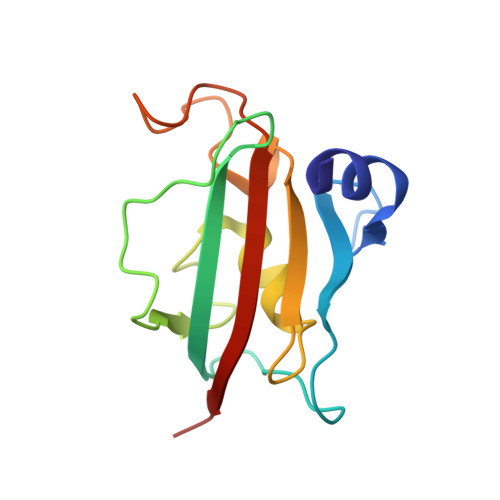Macrocyclic FKBP51 Ligands Define a Transient Binding Mode with Enhanced Selectivity.
Voll, A.M., Meyners, C., Taubert, M.C., Bajaj, T., Heymann, T., Merz, S., Charalampidou, A., Kolos, J., Purder, P.L., Geiger, T.M., Wessig, P., Gassen, N.C., Bracher, A., Hausch, F.(2021) Angew Chem Int Ed Engl 60: 13257-13263
- PubMed: 33843131
- DOI: https://doi.org/10.1002/anie.202017352
- Primary Citation of Related Structures:
7AOT, 7AOU, 7AWF - PubMed Abstract:
Subtype selectivity represents a challenge in many drug discovery campaigns. A typical example is the FK506 binding protein 51 (FKBP51), which has emerged as an attractive drug target. The most advanced FKBP51 ligands of the SAFit class are highly selective vs. FKBP52 but poorly discriminate against the homologs and off-targets FKBP12 and FKBP12.6. During a macrocyclization pilot study, we observed that many of these macrocyclic analogs have unanticipated and unprecedented preference for FKBP51 over FKBP12 and FKBP12.6. Structural studies revealed that these macrocycles bind with a new binding mode featuring a transient conformation, which is disfavored for the small FKBPs. Using a conformation-sensitive assay we show that this binding mode occurs in solution and is characteristic for this new class of compounds. The discovered macrocycles are non-immunosuppressive, engage FKBP51 in cells, and block the cellular effect of FKBP51 on IKKα. Our findings provide a new chemical scaffold for improved FKBP51 ligands and the structural basis for enhanced selectivity.
- Department Chemistry and Biochemistry, Clemens-Schöpf-Institute, Technical University Darmstadt, Alarich-Weiss Strasse 4, 64287, Darmstadt, Germany.
Organizational Affiliation:

















